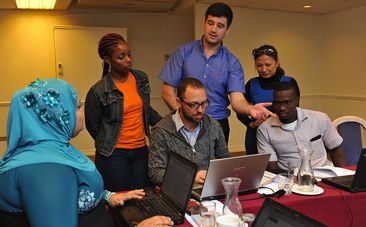
SA team develops HIV monitoring tool
A software application developed by the University of Cape Town to monitor patients on treatment for HIV and TB treatment is being implemented by countries such as Mozambique, Malawi, Vietnam and Pakistan. The electronic register, developed by UCT’s Centre for Infectious Disease, Epidemiology and Research (CIDER), is already in use in 3½000 clinics in South […]

A software application developed by the University of Cape Town to monitor patients on treatment for HIV and TB treatment is being implemented by countries such as Mozambique, Malawi, Vietnam and Pakistan.

The electronic register, developed by UCT’s Centre for Infectious Disease, Epidemiology and Research (CIDER), is already in use in 3½000 clinics in South Africa.
Known as TIER.net, the software was developed because paper registers used to keep track of HIV patients became too unwieldy.
Although another application eKapa 2 had already been developed to do this, it could not be used by all clinics as it relies on internet access to work. TIER.Net, on the other hand, operates offline, requiring only a computer.
Collaboration
The application is the result of a collaborative effort between CIDER, the Canadian International Development Agency, the US Centres for Disease Control and Prevention, and the World Health Organisation. The Western Cape and national government teams also participated in the development of the project.
Representatives from Mozambique, Malawi, Vietnam and Pakistan were at UCT recently for TIER.Net training.
CIDER has been responsible for overseeing the implementation of TIER.Net and eKapa 2 in the Western Cape, as well as training “master implementers” for the national Department of Health.
Originally the idea was that TIER.Net would only be used in the Western Cape, but it soon drew the attention of the Department of Health, who requested that it be made available to all clinics in South Africa.
There are more than 4½000 public sector clinics in South Africa, with TIER.Net being used in more than 3½000 facilities. It cannot be implemented in all clinics as some do not have electricity.
Once clinics have been equipped with bandwidth, they will cross over to eKapa 2.
“All three systems paper register, TIER.Net and eKapa are interoperable,” said CIDER’s Meg Osler, who oversaw TIER.Net’s software development. All three systems can be used to produce the same reports that feed into a single provincial and national database for ARV services.
Information gathered through TIER.Net, eKapa 2 or paper register is used to inform policy and resource allocation.
This is an edited version of a story first published by UCT. See www.uct.ac.za
Source: www.southafrica.info
